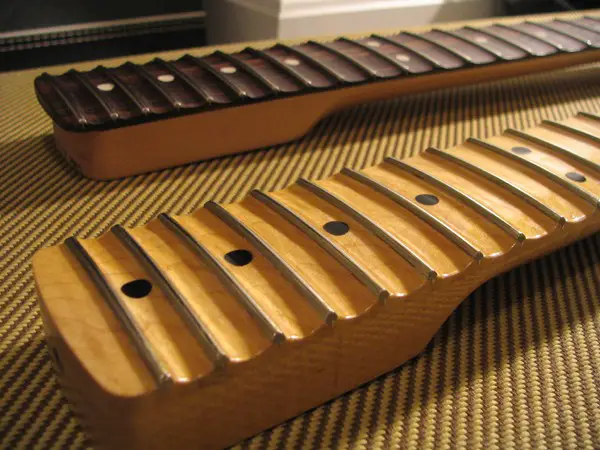Did you know if you have a scalloped fretboard you can vibrato by pressing the fret instead of making bends?
What is a scalloped fretboard? Scalloping a fretboard is when you remove wood from the fretboard so that there is less contact between your fingers and the wood. This eliminates massive amounts of friction. If you look at a scalloped fretboard from the side, it looks like the fret is scooped out. It is said that it is much easier to bend strings with a scalloped guitar, and many guitarists do claim that scalloped fretboards allow you to play faster, as there is minimal contact with the string.
In this article, I will discuss scalloped frets… So let us start!
1. What is a Scalloped Fretboard?
Scalloped frets have a recess in the surface of the wood, making the frets deeper than regular frets.
These are very rare to find and you will probably need them custom made by a luthier as finding a guitar that was built with purposeful scalloped frets can be hard to find and very expensive.
[amazon box=”B08RS6CLYG”]
The most common type of scalloped fretboard will offer just the last few frets scalloped (mainly from the 12th fret). This means up to the 12th the fretboard will have regular frets and beyond the 12th fret the fretboard is scalloped.
2. How do Scalloped Frets Work?
When playing a traditional guitar with a standard fretboard you will press down the fret until you feel wood under your fingers.
With a scalloped fretboard you can press down a lot further as the frets have been filed deeper. This is different, as you will not feel the wood under your finger. The top of the frets is themselves the indicator that you are pressing the note (not the wood underneath).
If you reach the point where the strings have strong contact between the top of the frets, and then keep pressing further it will sharpen the note. This means the vibrato can happen by pressing the string past the top of the frets, rather than bending the string.
3. What are the Pros of Having Scalloped Frets?
So there are a few reasons why guitar players want scalloped frets. The main reasons include:
- Easier to grasp frets – with scalloped frets you are playing the fret instead of the fretboard wood. This makes the fretting hand feel seamless, with less effort, resulting in a more relaxed posture.
- Easier to bend the strings – The strings glide along the tops of the frets easier, making the traditional bends easier. Your fingers do not drag along the fingerboard, and you have more flexibility with how you can position your fingers. .
- Vibrato is enhanced – As the strings glide seamlessly over the frets (instead of the fretboard wood) this makes vibrato slightly easier and in comparison may sound more powerful with more energy.
- Vibrato from pressing and bending – If you want to bend strings then you have two options that are available. You can either: Bend the string in the traditional sense, or press the string inwards. By pressing the strings in different ways makes it easier to add vibrato to chords.
4. What are the Cons of Having Scalloped Frets?
There are also many drawbacks from scalloping your frets.
- Irreversible modification – first thing you need to consider is that scalloping your fretboard is an irreversible modification. Luthiers scallop a fretboard by using a file to permanently chisel away the wood. Once chiselled away this wood cannot be placed back.
- Permanently Damage the fretboard – When going through the process of scalloping it is possible to file your way into the fretboard. People that have no experience could also permanently ruin the frets as well.
- De-value classic guitar – If you own a vintage guitar that is worth a lot of value then by scalloping it will de-value the guitar and it will be worth much less.
- Playability and feel – Playability is the biggest reason why I personally avoid scalloped fretboards. You need to develop an extra light touch, and change your technique slightly to compensate for not pressing to deep. Chords are especially hard to get used to playing, even simple open chords, as it is difficult to keep one note in tune. It is easy to press deep and sharpen the note you are playing, making the song sound out of key (as fretted notes can be easily pressed to hard). Overall, learning the guitar is challenging enough and realistically I think the average player should concentrate on removing barriers rather than adding them.
6. Does A Scalloped Fretboard Affect Tone?
If you scallop your fretboard it will affect the tone by adding a slight airiness to the tone. This is because it has more space to vibrate instead of vibrating next to a solid wooden wall.
Furthermore, it can make the sound slightly more precise as it cuts well when playing alongside other instruments. Furthermore, if you remove too much wood away it can make the tone sound worse, making the tone sound thin and scrappy.
Conclusion
Anyone can scallop his or her frets; however, I would say this is not for the faint-hearted.
The process of doing this requires removing the wood from the fret with a file with the aim of creating a deeper ridge under the fret. This affects the playability and makes the overall playing harder. You will be stuck with this forever and it can be challenging if you are looking to do some home recordings.
On the upside, it is really good to experiment with. So, if you have a spare guitar laying around that you don’t mind defacing then it can be fun.
Overall, if you only have one guitar or any vintage guitars don’t do it because it can be a risk as by carving into the frets can make the fretboard disintegrate faster and look unpleasant over time.
If you insist on taking that risk then the good news is that there are good luthiers out there who do scalloping and give exceptionally good results.


Great read!